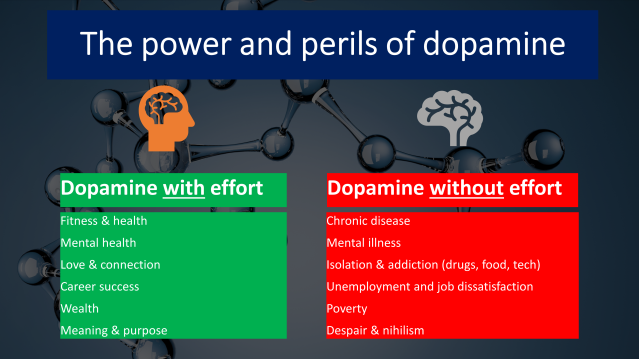Dopamine
Is Dopamine Running Your Life—or Ruining It?
Why no goal may be more important than mastering your dopamine.
Posted January 7, 2024 Reviewed by Devon Frye
Key points
- Dopamine is a neurotransmitter essential to human motivation.
- Dopamine can motivate either behaviors that help us or harm us.
- Modernity increasingly uses our dopamine circuit against us.
- The simple formula for a happy life is pursuing rewards that require effort.
Deep in your basal ganglia is a minute brain structure with a massive influence over your life. Known as the nucleus accumbens to neuroscientists, it measures in at a measly 1-2 cubic centimeters (for perspective, this is so small that your nucleus accumbens would fit into a teaspoon with room to spare). Yet this tiny piece of neural tissue is involved in nearly every action that you take and may even be responsible for much of our progress as a species.
Here are some achievements for which the nucleus accumbens can claim ownership:
- The works of Michelangelo, Picasso, Beethoven, and Shakespeare
- Every Olympic medal and sports championship
- All Nobel Prizes, bestselling novels, and Oscar-winning movies
- The advancement of human civilization, from cave-dwellers to city-dwellers
That's an impressive resume, especially for an area of brain matter so compact that you could easily rest it on your fingertip. Whenever you see people with drive, ambition, persistence, vision, dreams, or purpose, you are witnessing people with a nucleus accumbens operating the way that Mother Nature intended.
Yet this remarkable brain structure also comes with a dangerous dark side. Here are some of the modern hazards associated with a nucleus accumbens gone haywire:
- >100,000 annual deaths in the U.S. from drug overdoses
- The estimated 93 percent of Americans with impaired metabolic health (e.g., diabetes, fatty liver disease)1
- The millions of U.S. adults addicted to alcohol, nicotine, or gambling, or struggling to control countless other problematic behaviors
This same brain region critical to our survival and progress for thousands of years has arguably been hijacked in the span of just a few decades, morphing us from Dr. Jekyll into Mr. Hyde in the process. Although you likely won't find it on anyone's list of New Year's resolutions, learning how to regulate your nucleus accumbens may be the most important action you can take to elevate your quality of life.
Fortunately, there is a simple formula to follow to help this area of your brain work more like a superhero and less like a supervillain. But first, let's understand how the nucleus accumbens works and what's happened in recent years to help turn it against us.
Meet Your Nucleus Accumbens
Your nucleus accumbens is a powerhouse for two reasons. First, this region regulates a substance known as dopamine. Dopamine is a neurotransmitter—a chemical used by neurons—critical to reward-seeking and goal-directed behavior (see Figure below). Put simply, no dopamine means no motivation.
Dopamine is ancient. So ancient that it predates humanity, perhaps by millions of years. It is also the chemical pushing us to eat, drink, sleep, play, explore, procreate, go to work, and pay our bills.2 This mobilizing function makes even more sense after learning that dopamine is a precursor to epinephrine and norepinephrine (two other energizing substances in the body).

The second reason that the nucleus accumbens and dopamine regulation are so powerful is because human existence was historically so difficult. Life demanded this biochemical drive be potent just for us to survive.
Until the last few centuries, each day presented daunting challenges in the form of obtaining food, finding shelter and potential mates, protecting against weather, predatorial animals and other humans, and surviving famine and disease. Even the most basic behaviors necessary for living often required enormous and sustained levels of energy and motivation. Were dopamine and our nucleus accumbens any less proactive, our ancestors would not have possessed the tenacity to survive these obstacles.
With progress, thankfully, the amount of exertion necessary to survive diminished. The same goals that once demanded copious amounts of time and energy became simple conveniences for most people. To our ancestors, a world like today—where high-calorie foods, sexual stimulation, and boundless forms of entertainment and pleasure are cheaply available—would have seemed like paradise.
However, the comforts of modernity are instead a mixed blessing because even though our survival needs are now easily fulfilled, our biological drives for them remain as strong as they were thousands of years ago. When our drives for activities such as eating, sex, and pleasure-seeking no longer require time and effort to satisfy, the result isn't necessarily paradise. The result may also be addiction, metabolic diseases, and mental illness. These paradoxical consequences of modernity are a likely cause of the most pressing health concerns of the 21st century. For example:
- Why are obesity and other metabolic disease so common in the U.S.? Because our drive to eat and consume calorie-dense foods is the same as for hunter-gatherers thousands of years ago—only we now have effortless, 24-7 access to these foods.
- Why is addiction suddenly everywhere? Because our reward drive is as insatiable as it was for our ancestors—only now we have access to pleasure sources far more easily, varied, and intense than anything available to people in the past.
- Why is mental health declining despite the conveniences of modern life? Because many people in the U.S. define happiness in terms of pleasure-seeking, status, and material goods. This type of hedonic happiness is transient, however, and can fuel withdrawal, cravings, abuse, and depression. In contrast, sustainable happiness in the form of meaning, connection, and contentment (called eudaimonia by Aristotle) requires time, sacrifice, and energy to obtain and cannot be purchased or derived from substances.
The Simple Formula for Mastering Dopamine
Although dopamine is essential to life, dopamine without effort negates quality of life. In the form of hyper-palatable foods, drugs and alcohol, ever-present technology, and pervasive advertising, modernity figured out how to hack our eons-old reward-seeking circuits for its own purposes. Seduced by promises of pleasure and happiness, many of us have instead found disease, despair, detachment from others, and premature death.3
The solution to this modern crisis likely won't be found through medicine, therapy, or even artificial intelligence. But I argue that it can be found using the most time-tested strategy for success in human history: effort.
The formula for health and happiness is a life oriented towards effortful rewards. Pursue goals that demand your best self (e.g., intimate relationships); seek out achievements won only through dedication and sacrifice (e.g., fitness); and create a lifestyle encouraging ongoing learning and personal growth (e.g., self-actualization). This is one lesson from history that will never become obsolete.
References
1. O'Hearn M, Lauren BN, Wong JB, Kim DD, Mozaffarian D. Trends and Disparities in Cardiometabolic Health Among U.S. Adults, 1999-2018. J Am Coll Cardiol. 2022 Jul 12;80(2):138-151. doi: 10.1016/j.jacc.2022.04.046.
2. Juárez Olguín H, Calderón Guzmán D, Hernández García E, Barragán Mejía G. The Role of Dopamine and Its Dysfunction as a Consequence of Oxidative Stress. Oxid Med Cell Longev. 2016;2016:9730467. doi: 10.1155/2016/9730467.
3. Case A, Deaton A. Mortality and morbidity in the 21st century. Brookings Pap Econ Act. 2017 Spring;2017:397-476. doi: 10.1353/eca.2017.0005.




